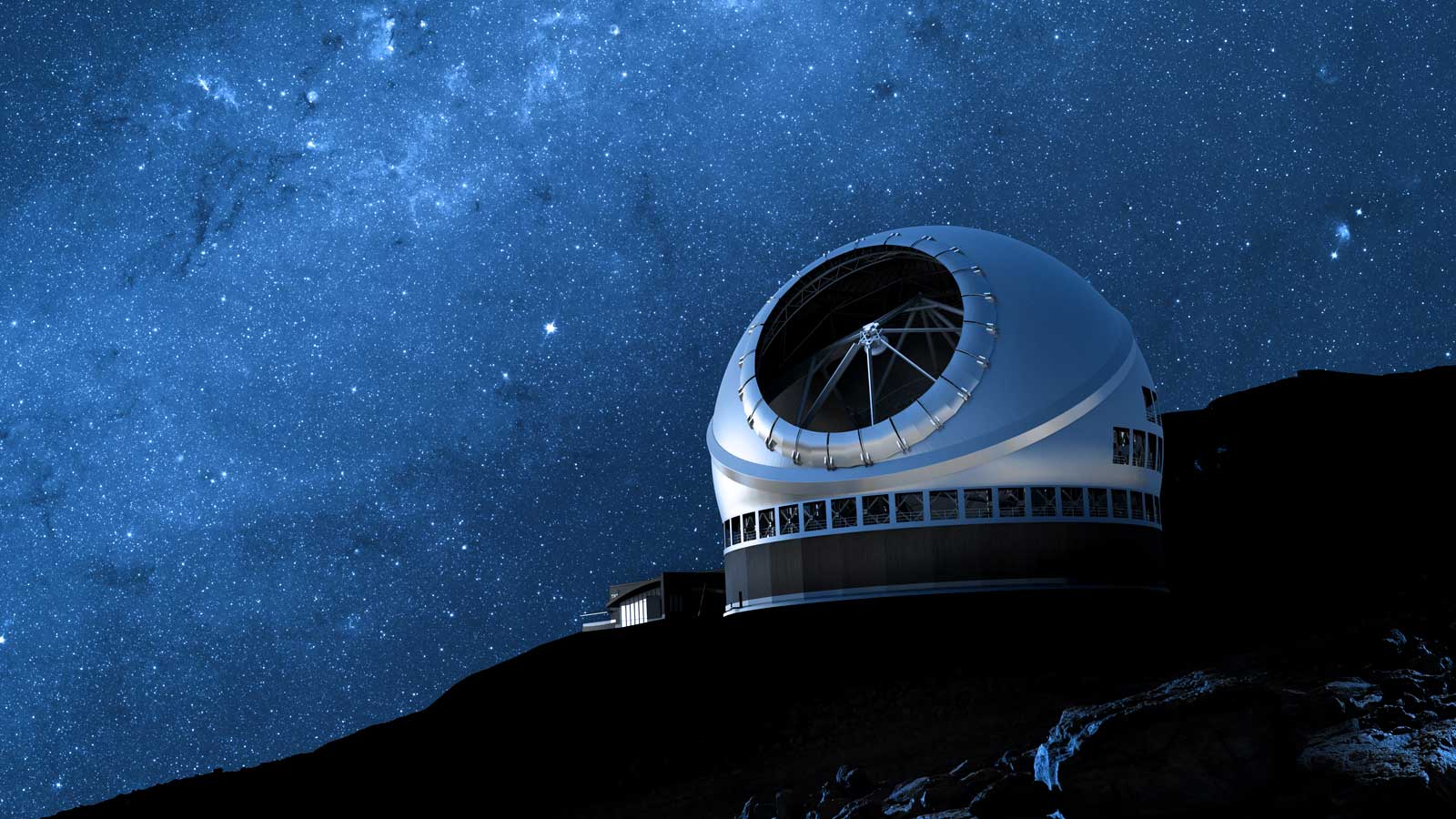
View of the telescope structure and mirrors through the enclosure opening. The inside of the dome is illuminated to show the opened ventilation vents on the side, one of the two Nasmyth platforms to the left, and the telescope in an inclined position with its primary, secondary and tertiary mirrors. The secondary mirror is seen in reflection on the primary mirror. The back of the secondary mirror shows the small launch telescope which is used to propagate the laser light to form an artificial laser guide star to be used for image correction by TMT’s adaptive optics system.
Image of the night sky and milkyway seen through the telescope enclosure opening. The secondary mirror and its six spiders (supporting beams) is seen across the nighttime sky, reflecting the surface of the primary mirror with the shadow of the secondary mirror and spiders in the center.
Fisheye view of the telescope primary mirror and telescope structure in broad daylight. The telescope is pointing vertically in direction of the circular enclosure opening. The secondary mirror, convex in shape, is seen against the sky background, held above the primary mirror by six structural beams (called “secondary mirror spiders”). The flat oval tertiary mirror is seen in the middle of the primary mirror, whose hexagonal segments are clearly defined in this image. To the left of the primary mirror sits the first-light instrument WFOS, a multi-object spectrograph working in seeing-limited mode. To the right, behind the telescope structure, we can spot the blue container hosting TMT’s adaptive system NFIRAOS. A telescope structure access platform can be seen partly on the top of the image.
The US-ELTP group picture in the Seattle Convention Center for AAS 241 in Seattle, Washington.
TMT and US-ELTP attendees at US-ELTP's booth at the 240th annual American Astronomical Society conference.
The US Extremely Large Telescope Program illustration
TMT science operations include activities and user services cycling from proposal submission to the preparation and execution of observing programs, and finally process and archive of the data collected at the telescope.
Diagram showing the coordination of the various teams involved in supporting TMT operations over a 24h cycle.
This figure shows the transition from construction to operations through subsystem Fabrication/Integration and Testing (INT), Construction, Assembly, Integration and Verification (CAIV), Science and Operations Commissioning (SOC) and the period of early operations leading to steady-state operations (some acronyms are used to denote different levels of reviews: Pre-Shipment Review (PSR), Site Acceptance Review (SAR), Final Acceptance Review (FAR) and Science Readiness Review (SRR)).
This Figure shows the various activities involved in the maintenance and cleaning of TMT optics, with their duration and the number of personnel allocated. This is a preliminary allocation which will be updated as the workflows are finalized.
US ELT group picture at the 235th American Astronomical Society Meeting in Honolulu on January 2020, featuring representatives of the National Science Foundation’s (NSF) National Optical Infrared Astronomy Research Laboratory (NOIRLab), the Giant Magellan Telescope Organization (GMTO), and the TMT International Observatory (TIO). [ From top left: Amanda Kocz, Director of Communications (GMTO); Rebecca Bernstein, Project Scientist (GMTO); Chris Martin, TIO SAC Member, Caltech Professor; Christophe Dumas, TMT Observatory Scientist & Head of Operations (TIO); Gary Sanders, TMT Project Manager (TIO); Mike Bolte, TIO Board of Directors, UCSC Professor; Sandra Dawson, Manager Hawaii Community Affairs (TIO); Fengchuan Liu, TMT Deputy Project Manager (TIO); Warren Skidmore, Instrumentation System Scientist (TIO); Pat McCarthy, Director NSF National OIR Astronomy Research Laboratory (AURA); Mark Dickinson, US-ELT Program Scientist (AURA); Taft Armandroff, Vice-Chair GMTO Board of Directors; Heidy Kelman, Mechanical Design Engineer (GMTO); Jim Fanson, GMT Project Manager (GMTO); Sydney Wolff, US-ELT Program Director; Caty Pilachowski, TIO Board of Directors (AURA); Gordon Squires, Head Communication & Vice President External Affairs (TIO) ]